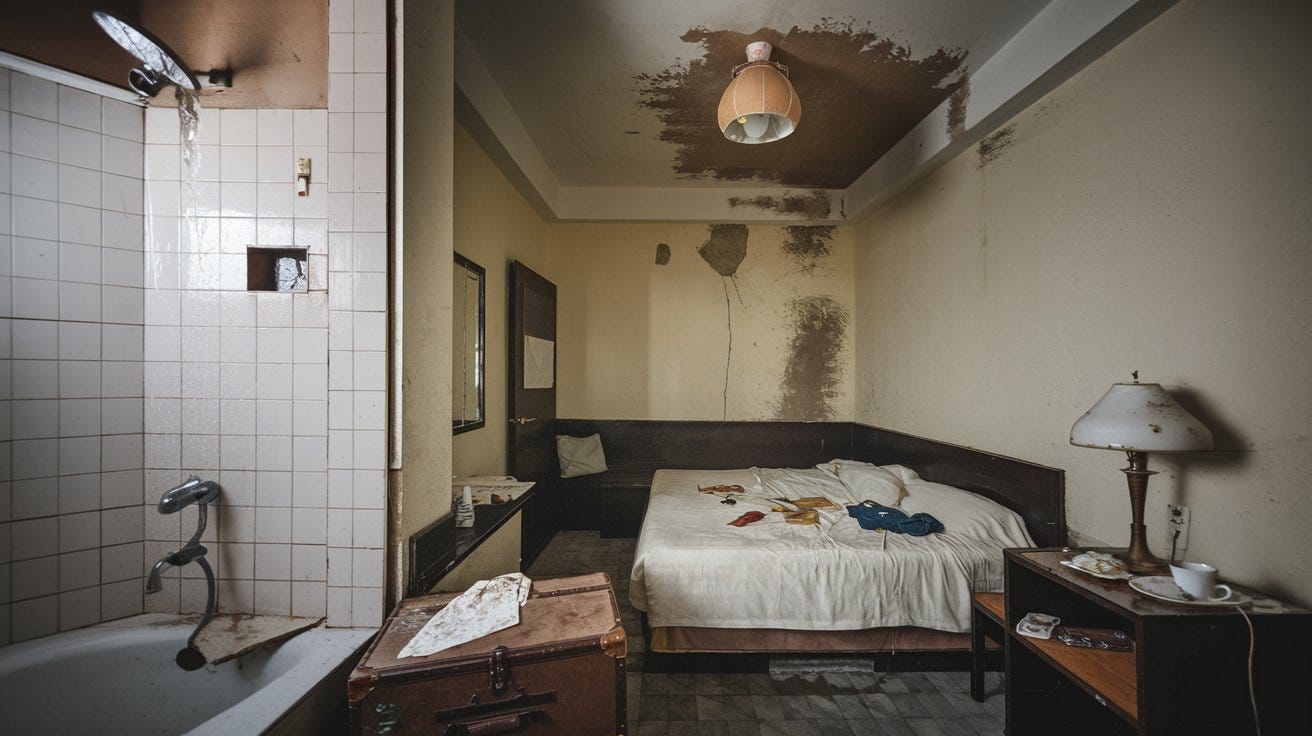Mistake No 6: Why Poor Maintenance Scares Away Guests
How neglecting upkeep can ruin your reputation and cost you bookings.
Introduction
Imagine this: A guest checks into your hotel, looking forward to a relaxing stay, only to find leaky faucets, flickering lights, or a damp smell in their room. They leave a negative review, never return, and warn others to avoid your property.
Poor maintenance isn’t just an eyesore—it’s a guest experience killer. Let’s explore why ignoring upkeep is a costly mistake and how you can fix it to enhance guest satisfaction and protect your reputation.
Why Poor Maintenance Hurts Your Hotel
1. Disrupts Guest Experience
Broken amenities or unclean rooms leave guests frustrated, ruining their stay.
2. Damages Your Reputation
Unhappy guests often share their experiences online, deterring potential bookings.
3. Increases Costs Over Time
Small maintenance issues become bigger, more expensive problems when ignored.
The Cost of Neglecting Maintenance
• Lost Bookings: Bad reviews make potential guests think twice before choosing your hotel.
• Operational Disruptions: Equipment breakdowns create last-minute hassles for your staff.
• Revenue Drain: Deferred maintenance results in expensive emergency repairs.
But proactive maintenance can turn this around. Let’s look at how.
A Story of Transformation
A boutique hotel in Jaipur noticed declining ratings despite excellent service. Guests frequently complained about broken ACs, leaky taps, and noisy fans.
The owner realized maintenance was the culprit and took action:
• Weekly room inspections were implemented.
• A reporting system for staff and guests was introduced.
• Funds were allocated to address maintenance issues immediately.
Within three months, guest satisfaction soared, reviews praised the hotel’s upkeep, and bookings increased.
How to Fix Maintenance Issues
Step 1: Create a Maintenance Schedule
• Plan regular inspections for rooms, public areas, and equipment.
• Include seasonal checks to prepare for high-demand periods.
Step 2: Train Your Team
• Educate staff to spot and report maintenance problems early.
• Encourage a culture where everyone takes responsibility for upkeep.
Step 3: Track and Monitor Repairs
• Use a simple log or software to track issues and ensure timely resolution.
Step 4: Allocate a Budget
• Set aside funds specifically for maintenance and small upgrades.
What Happens When You Prioritize Maintenance?
1. Enhanced Guest Experience:
Guests feel comfortable and valued, leading to positive reviews and repeat bookings.
2. Improved Reputation:
A well-maintained property attracts more bookings and builds trust with your guests.
3. Cost Savings:
Preventative maintenance reduces the need for expensive emergency repairs.
Take Action Today
Don’t let small issues snowball into big problems. Proactive maintenance ensures your hotel remains a trusted and appealing choice for guests.
Get Lifetime Access to the Hotel Growth Formula Online Video Course and join the world’s leading community for hotel professionals.
In my Hotel Growth Mastermind Community, I’ll teach you:
• How to create a structured maintenance plan.
• Simple tools to track and manage repairs.
• Strategies to enhance guest experience through consistent upkeep.
Why This Works
Overcoming Common Concerns:
• “I can’t afford frequent maintenance.”
Preventative maintenance costs less than emergency repairs and bad reviews.
• “I don’t know how to manage it all.”
A simple checklist and tracking system are all you need to start.
Reassurance:
Well-maintained spaces don’t just look good—they build trust and loyalty with guests. Even small, consistent efforts make a big difference.
Conclusion
Maintenance isn’t just about fixing things—it’s about creating a seamless guest experience and protecting your hotel’s reputation. Start prioritizing upkeep today to ensure long-term success.
Stay tuned for Mistake No 7: Why Overpromising and Underdelivering Hurts Your Hotel’s Brand.




